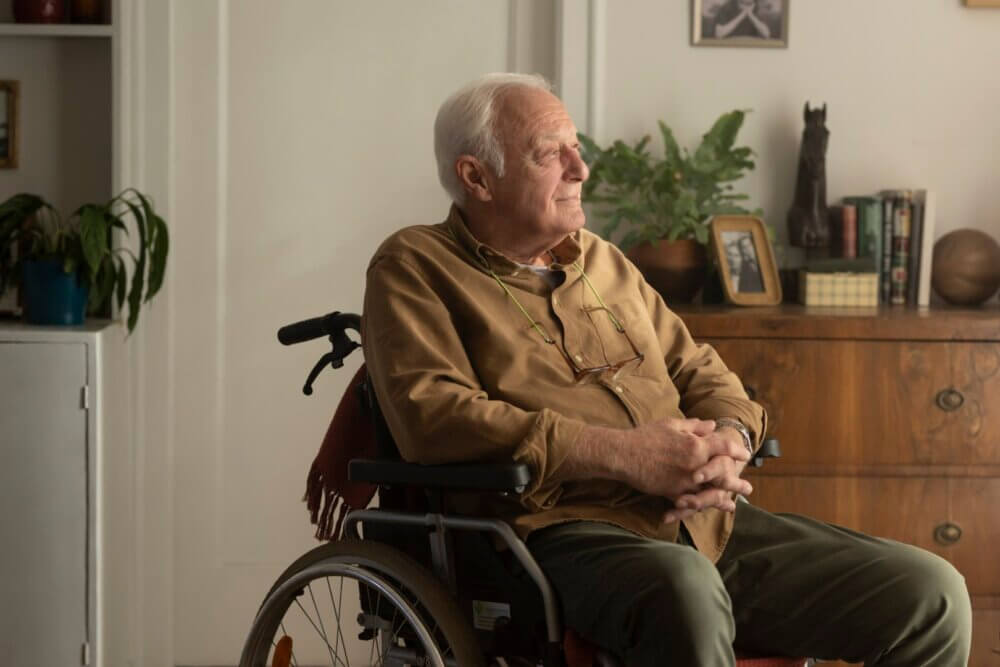Dementia Care At Home
A diagnosis of dementia doesn’t necessarily mean that someone will need to move into a residential care home. We provide exceptional care to help persons with dementia live a happy, safe, and protected life in the comfort of their own homes.
Change can be challenging for those with dementia. If a person is no longer safe when left alone, arranging care for people in their own homes may be the best alternative.
Dementia care at home is becoming increasingly popular, and properly trained Care Professionals can help with Alzheimer’s and other variations of the disease.
The impact of dementia doesn’t just affect the elderly person with the condition. It will also impact the lives of their families. This is particularly true if you have become a family carer.

Benefits of Live-in Personalised Care
A person with dementia can feel apprehensive about being moved into a nursing home, as their surroundings will be unfamiliar. That is why a stay-at home approach to dementia care is becoming popular. They can continue their daily activities while still receiving complex care and medical care to ease the effects of any symptoms they may be experiencing.
We can improve physical activity as well. Having an escort allows you to get out of the house more often or feel more confident moving around inside your home.
Your live-in Care Professional will have a spare room in your home and will be there to support you each day, as much or as little as you like and according to what matters to you most. You will determine care hours.

Make Daily Life Easy with a Live-in Carer
A live-in Care Professional can make it possible for care recipients in need of life care to remain safe, clean, and comfortable in their homes.
Live-in carer duties can include:
- Daily living – assistance with daily tasks and personal care like bathing, dressing and toileting
- Continence care, whether it is changing incontinence pads or managing a stoma or catheter
- Medication support, including prompts or administering medication
- Support with pain management
- Help moving around the home
- Housekeeping duties, including vacuuming, dusting, changing beds, and doing the laundry
- Household tasks like Preparing meals
- Caring for your pet
- Running errands to collect prescriptions or food shopping
- Companionship and supporting your independent living at home, including accompaniment to social activities.
Care in the home by competent, professional live-in carers provides better mental health outcomes than other care options. It has also been found to provide huge benefits to physical health and a much better quality of life.

Our Care Professionals
Our team of healthcare professionals have expertise in providing quality of life to people with dementia to achieve an independent life at home.
Our care workers have all undergone comprehensive training and evaluation to ensure they deliver specialist care for people living with every stage of dementia.
A dementia carer will have had essential background checks, such as DBS (Disclosure and Barring Service).

What is Dementia?
Dementia is a term for various symptoms and illnesses that damage the brain and memory over time.
Abnormal alterations to the brain create the conditions included under the umbrella term “dementia.” The brain is made of billions of neurons (nerve cells) that exchange chemical impulses with one another. When a person develops the disease, these neurons are destroyed, which means that signals are not transmitted efficiently, affecting all bodily processes.
These physical symptoms are usually minor at first, but, they can grow severe enough to interfere with everyday life. Two key factors: the afflicted areas of the brain and illness-causing the disease mostly determine the symptoms that someone with dementia feels.

Forms of Dementia
Vascular Dementia
Damage to the arteries that carry blood to the brain causes this sort of dementia. Blood artery abnormalities can lead to strokes or have other effects on the brain, such as harming the white matter fibres.
the most prevalent symptoms include:
- Issues with Problem-solving
- sluggish thinking
- loss of concentration and organisation
These are usually more noticeable than memory loss.
Alzheimer’s
The most common form of dementia is Alzheimer’s disease.
Not all causes of Alzheimer’s disease are known, but doctors know that some cases are linked to abnormalities in three genes. These abnormalities can be passed on from parent to child, and are linked to a small number of cases. While numerous genes are likely implicated in Alzheimer’s disease, apolipoprotein E4 is one key gene that raises risk (APOE).
Plaques and tangles have been found in the brains of people with Alzheimer’s. Plaques are tau protein-based fibrous tangles, whereas tangles are beta-amyloid protein clusters. These aggregates are considered to harm healthy neurons and the fibres that link them.
Parkinson’s Disease Dementia
This type of dementia affects about 50% to 80% of people with Parkinson’s disease, a nervous system disorder. Symptoms usually appear roughly ten years after a person is diagnosed with Parkinson’s disease.
This kind is closely related to Dementia with Lewy Bodies. They both have similar symptoms, and persons with both have Lewy bodies in their brains.
Frontotemporal dementia (FTD)
The destruction of nerve cells and their connections in the frontal and temporal lobes of the brain characterises this category of illnesses. These parts of the brain are linked to personality, conduct, and language. Common symptoms all affect behaviour, personality, thinking, judgement, language, and mobility.
An individual with FTD may have:
- Changes in personality and behaviour
- Sudden lack of inhibitions in personal and social contexts
- Problems finding the correct words to say when speaking
- Movement issues such as shakiness, balance issues, and muscle spasms
Advanced Dementia
The later stages of dementia are commonly called ‘advanced’ or ‘severe’ dementia, but defining ‘advanced dementia’ is difficult.

Huntington’s Disease
Huntington’s Disease is a genetic brain condition that is handed down through family members. While your loved one may have the Huntington’s disease gene at birth, symptoms usually do not appear until they are between the ages of 30 and 50.
People with Huntington’s disease experience some of the same symptoms as people with other types of dementia, such as difficulties with:
- Thinking and reasoning
- Memory
- Judgement
- Planning and organising
- Concentration
Lewy Body Dementia
Lewy bodies are aberrant balloon-like protein aggregates discovered in the brains of persons suffering from Lewy body dementia, Alzheimer’s disease, or Parkinson’s disease. One of the most frequent kinds of progressive dementia is Alzheimer’s disease.
Acting out one’s dreams while sleeping, seeing things that aren’t there (visual hallucinations), and issues with focus and attention are all common indicators and symptoms. Uncoordinated or sluggish movement, tremors, and stiffness are other symptoms (parkinsonism).
Creutzfeldt-Jakob Disease
This is a rare disorder in which prions induce normal proteins in the brain to fold into unusual shapes. The injury causes dementia symptoms to appear unexpectedly and rapidly worsen.
You or your loved one might have:
- Problems with memory and focus
- Ineffective decision-making and poor judgement
- Confusion
- Swings in mood
- Depression
- Sleep issues
- Muscle twitching or jerking
- Difficulty walking
Mixed dementia
Mixed Dementia is a mix of two types of dementia. Alzheimer’s disease and vascular dementia is the most common pairing.
Research shows that many people with dementia aged 80 and up had a mix of causes, such as Alzheimer’s disease, vascular dementia, and Lewy body dementia. Mixed dementia is the subject of continuing research to see how it impacts symptoms and treatments.
Normal Pressure Hydrocephalus
A buildup of fluid in the brain causes this sort of dementia. Symptoms include difficulty walking, thinking, and focusing, and changes in attitude and conduct.
Draining excess fluid from the brain into the abdomen using a long, thin tube known as a shunt can alleviate some symptoms.
Wernicke-Korsakoff Syndrome
A significant thiamine deficiency (vitamin B-1) in the body causes this condition. It most usually occurs in those who have been strong drinkers for a long time.
Memory loss is the most common dementia symptom in this illness. Typically, a person’s problem-solving and cognitive abilities are unaffected.

Home Instead South Lanarkshire Dementia Home Care
Home Instead South Lanarkshire offers comprehensive dementia home care services to Lanark, Carluke, Biggar & the surrounding areas. Our dedicated team of Dementia care professionals are equipped with specialised training and essential skills and knowledge to navigate the challenges associated with dementia care.
If you are or a loved one would like more information around the different services we offer at Home Instead South Lanarkshire Please don’t hesitate to get in touch.

Areas We Serve
Lanark, Carluke, Biggar & the surrounding areas
G75 0, G75 9, ML10 6, ML11 0, ML11 7, ML11 8, ML11 9, ML12 6, ML3 0, ML3 6, ML3 7, ML3 8, ML3 9, ML8 4, ML8 5, ML9 1, ML9 2, ML9 3
7 St Leonard St, Lanark ML11 7AB, UK
01555 700601